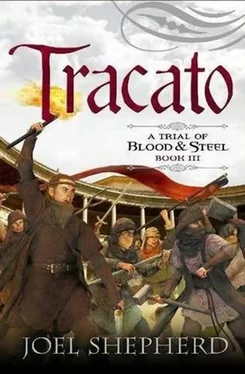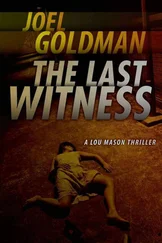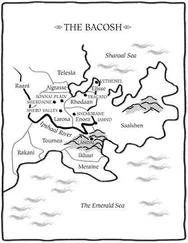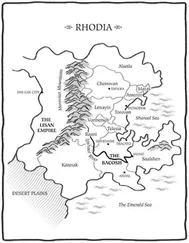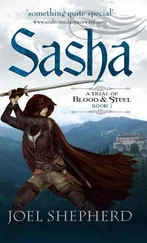
What amazed Sasha most about Tracato was that she felt relatively safe walking the streets. They were teeming, like Petrodor had been, with carts and handwagons, mules hauling loads, and cityfolk walking. There were tradesmen of all description, and many whose trade Sasha could not begin to guess at. There were rich folk in palanquins and carriages, patrolling Blackboots, red-coat city administrators, fellow Nasi-Keth and, of course, plenty of serrin.
Most astonishing were the buildings, rising for several storeys to either side of the road. The avenues of Tracato were like little canyons through which rushed rivers of people and commerce. Frequently these avenues opened into courtyards. There were buildings in garish colours, with ornamental designs, turrets and crenelations, grand archways and louvred balconies. The courtyards were also popular with performers and orators, who stood on platforms and denounced the workings of council, or the Justiciary, or indeed the Tol’rhen. Others warned of impending doom and rising oceans, or announced the latest news of the war in Elisse. Elsewhere, beggars lining walls crouched with outstretched hands.
“You have beggars too,” Sasha observed sadly.
“Oh, lots,” replied Daish, who had come with her. “Too many.” He’d wanted to see the Mahl’rhen again…as had six of his friends. Sasha hadn’t intended on leading such a large group to see Errollyn, but the Tol’rhen was like that; its students hung together and loved new experiences.
“It’s just sad to see the wealthiest city in Rhodia has beggars,” she said.
“Ulenshaal Sevarien blames the nobility,” said Daish, pulling a coin from his pocket. “He says they hoard all the wealth and make others work for them. He says they create beggary, and there’d be less if we got rid of them.”
“So there’re no beggars in Enora then?” Sasha said warily.
Daish shrugged. “So Sevarien’s theories aren’t perfect.” He flipped a coin to a beggar, who grasped it with dirty hands.
Soon they turned down a back road away from the avenues, and another world opened up. Household backyards opened onto further courtyards, some homely, others messy, and occasionally squalid. These too bustled with activity: tradesmen hammering, firing, smoking, sawing or tanning. Smells and fumes from the yards assailed the nostrils, and sometimes the eyes, and walking was strictly single file past the bustle of men and women carrying their loads.
“You know,” Sasha said to Daish above the roar and wheeze of a backyard bellows, “when I first heard about the wealth of Tracato, I had an image of everyone lazing around sunning themselves, as wealthy people might. Now that I get here, I find that Tracato is wealthy because everyone’s so busy!”
“I think it’s a little sad,” Daish replied, edging past four men hauling a huge pig carcass. “Everyone is obsessed with money, they rush and rush and think of little else.”
“If Rhodaan weren’t wealthy, it couldn’t have survived two centuries of being attacked by its neighbours,” Sasha reasoned. “Taxes from all this pay for the Steel.”
“True. But I’d love to travel to Lenayin. As you describe it, life seems simpler there.” Sasha thought about that, and gazed around at every new thing.
They all paused at another courtyard, to peer at the furnace beyond some guarded gates. Within, shirtless men in leather smocks fed wood and coal into a narrow mouth of flames, and the heat was so intense, Sasha could nearly feel her eyebrows singe from twenty paces away. About the other side of the furnace, men would be pouring steel, but she’d never seen it before. Very few had, for these were the great furnaces of serrin steel, or “the folding,” as the serrin called it. Serrin had perfected the art in Saalshen hundreds of years before, and now guarded their secret carefully.
The Mahl’rhen, when they came to it, was a surprise. A lane ran to a courtyard, where arts were displayed at a huge market, and the laneways were alive to the chip and clang of sculptors and metal workers.
The lads finally dragged her onward, where an arch at the courtyard’s far side announced in typically understated serrin style the entrance to the Mahl’rhen. Four serrin stood guard there, and gave the Nasi-Keth lads and Sasha curious looks, but made no move to stop them entering.
They entered a courtyard garden that Sasha thought looked something like a Torovan noble garden. But the square angles of human inspiration were infused with a serrin randomness, little tangles of natural greenery, and the sinewy twist of an artificial stream tumbling over small, smoothed stones.
About the garden walked mostly serrin, some in the flowing robes that they preferred in their own quarters, others in the more practical garb of city folk. Some nodded and smiled at the Nasi-Keth in passing, and the lads quietened their exuberance a little, showing respect in the house of the serrin.
Paths led past more courtyards, amidst which rose stone buildings that an eye trained in human structures could not precisely place. These were residences, and often kitchens, with underground storages-Errollyn had already given her the tour, though he still knew barely a fraction of the Mahl’rhen’s intricacies. Tracato’s ever-present water courses ran through the complex, taking advantage of the gradual slope to fashion little streams. They passed a grand pool in which naked serrin children splashed and yelled, supervised by several adults with one eye on a board game, the other on the children. Sasha had never seen serrin children before. Amusingly, they were just as noisy and troublesome as human children, proving, perhaps, that serrin sophistication was more a question of nurture than nature.
Sasha recalled her way from her two previous visits, yet at an intersection where she knew to turn right, several serrin came past running the other way. Sasha heard a distant commotion, other nearby serrin stopping to look. She headed that way herself, the lads following.
Soon they came to another entrance to the Mahl’rhen, but this one filled with armed figures, mostly serrin. From outside came a lot of shouting. Daish approached an older serrin lady, and asked what was happening.
“There’s been trouble at this gate for months,” she told them. “The Civid Sein have been camping here, displacing the farmers’ stalls and causing quarrels. I hear some have complained to the Blackboots, requesting the squatters be removed.”
Sasha and the Nasi-Keth lads edged through the wall of cautious serrin at the gate, to observe the scene beyond. It was a courtyard like the one they’d entered through, yet this was a market of farmers selling produce. Amidst the stalls, makeshift tents had been erected, tanned hides over poles and rickety wooden frames. Defending the tents from perhaps thirty armed Blackboots was a mob of raggedly dressed rural folk, armed with hoes, scythes and other tools. So far it was merely pushing and shouting, as the Blackboots appeared to demand the makeshift settlements be taken down.
“Perhaps we should try to intervene?” one of the lads suggested.
“With this lot?” Daish said dubiously.
“We are the Nasi-Keth,” said another, stubbornly. “It is our duty to maintain the peace.”
Sasha shook her head. “Svaalverd is a sharp tool, only good for offence. We can kill whomever we choose, but we can’t keep two sides apart who’d rather fight.”
The Nasi-Keth boy ignored her and strode forward. Sasha watched, as he and two others joined the shouting. The Blackboots did not seem pleased to see them. Soon the three Nasi-Keth lads were arguing firmly in favour of the squatters, as stall owners guarded their produce and looked displeased with everyone.
Читать дальше
